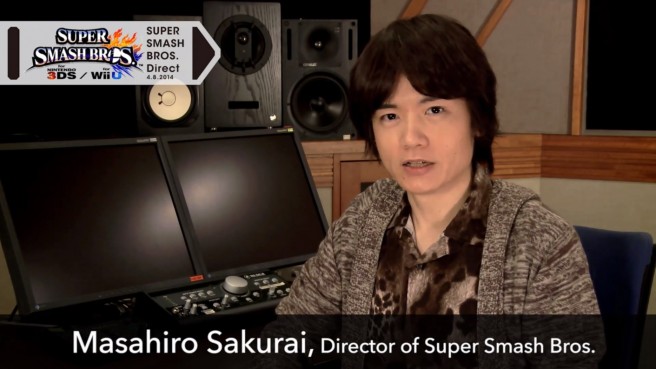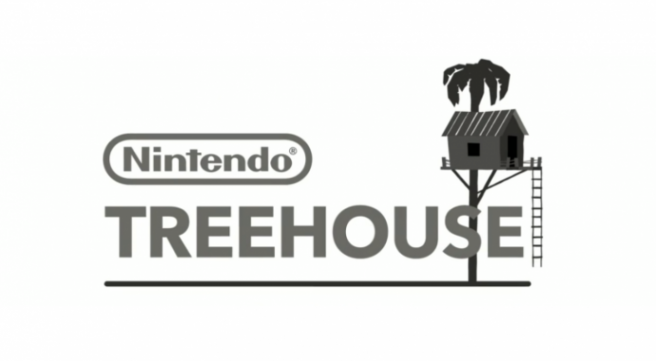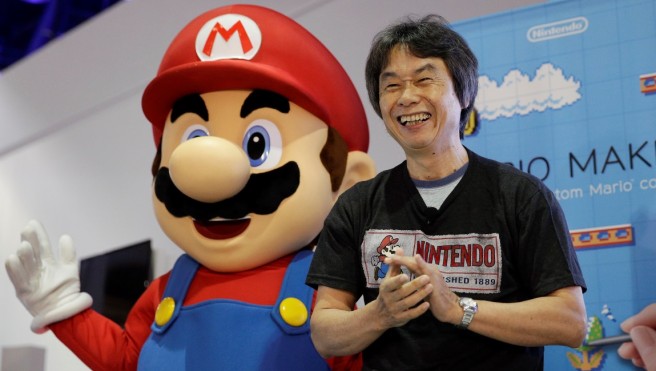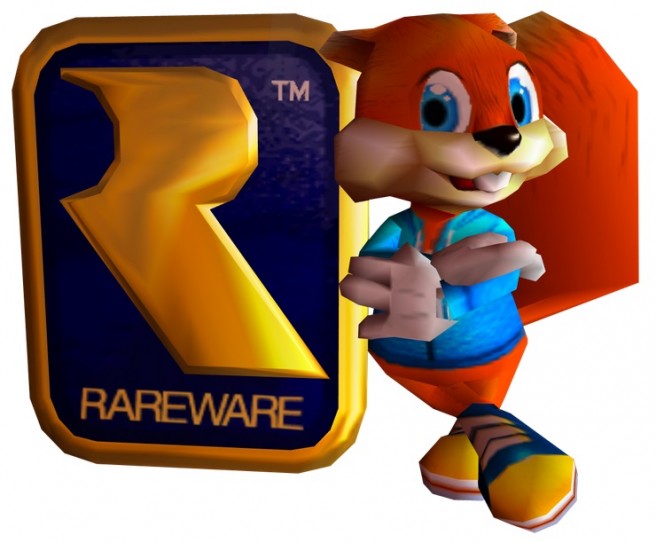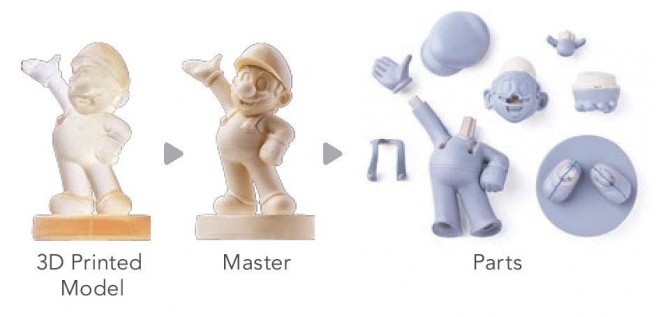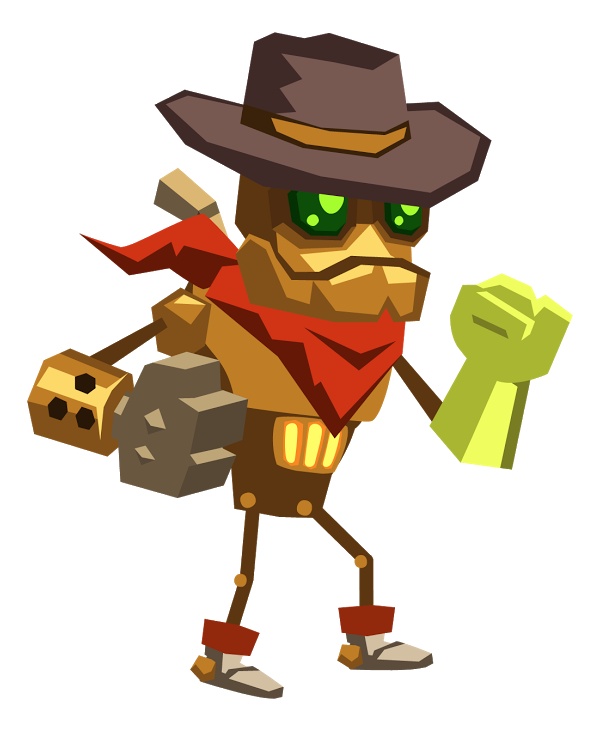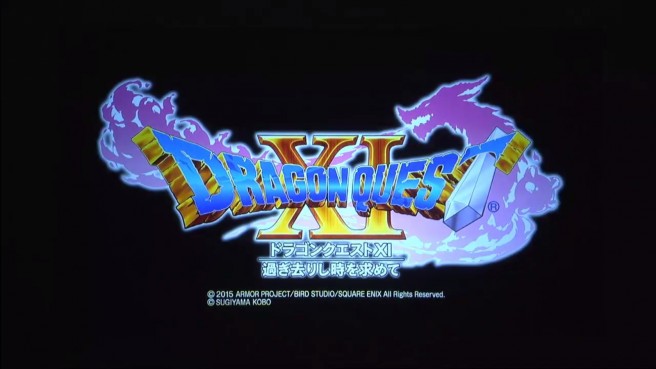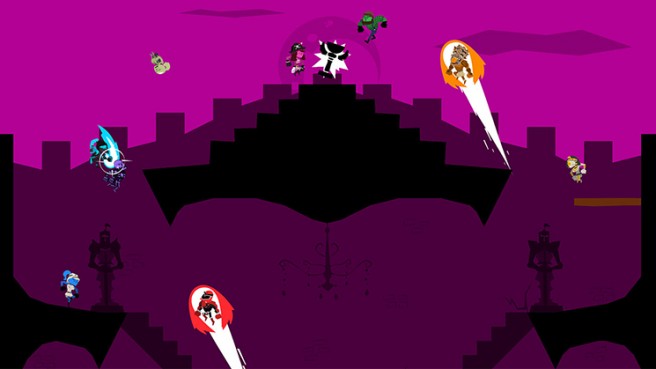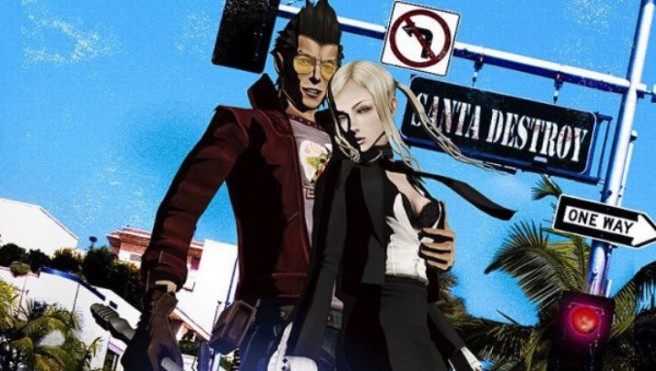Nintendo Treehouse staffer talks about Sakurai’s commitment to making Smash Bros.
Posted on 10 years ago by Brian(@NE_Brian) in General Nintendo, News | 18 Comments
Yesterday, we posted a number of tidbits coming from a Part Time Gamer interview with Nintendo Treehouse localization writer/editor Chris Pranger. If you missed that, you can read it right here.
Gamnesia has since transcribed Pranger’s comments about Super Smash Bros. director Masahiro Sakurai. Here’s what we said about the developer:
“Sakurai’s outlook on the games is very dire. He gets really sad when he finds out how people are reacting and he gets sad whenever there’s a leak, because he really wants to create. And he’s an auteur in the most crazy sense. He’s basically Vincent Van Gogh cutting off his own ear and we’re sitting there going ‘Frick! Stop doing that!’ And he’s like ‘You don’t get it, guys, my vision!'”
Chris Pranger shares tidbits about working for Nintendo Treehouse
Posted on 10 years ago by Brian(@NE_Brian) in General Nintendo, News, Wii | 13 Comments
Chris Pranger, who works at Nintendo Treehouse, appeared on the latest episode of the Part-Time Gamer podcast. Pranger shared a few interesting details about his position his position as well as working at the company as a whole.
You’ll find a summary of information from the podcast below. For the full discussion, visit this link.
– Nintendo’s media policy has recently changed regarding employees being more open about talking about their work but not spoilers or anything
– He is the voice of the first level boss in Star Fox Zero; also working on the game
– Talks about NOA using employees as voiceovers for fun and cheap work
– Nintendo has a game library where employees can check out games for all systems in order to be well-versed in gaming; this is how he played Bioshock Infinite
– Sakurai kills himself for his games; he is very sensitive to fan feedback
– Localization costs a ton of money and often the vocal minority of fans who want a game localized isn’t a large enough consumer base to justify the localization costs
– The original Xenoblade is an example he gives of this
– Nintendo of Europe ate the cost on that project
More: Chris Pranger, interview, top
Nintendo says the company often listens to fans
Posted on 10 years ago by Brian(@NE_Brian) in General Nintendo, News | 82 Comments
Examiner recently spoke with Scott Moffitt, executive VP of sales at Nintendo of America. One of the topics the two sides discussed was how Nintendo uses fan feedback and looks at industry trends.
Moffitt told the site:
“We like to be different, unique and tend to march to the beat of our own drum. I would never say we’re blind to the outside world, but we listen to our game fans a lot. We’re always curious to [see] their reaction to new games like Splatoon. We don’t use them as our sole inspiration but we certainly like to hear what they are saying, enjoying and appreciating about a game, in addition to what they would like in future iterations of that game. We take a broad look and always pay attention to what is going on beyond our walls with trends, but it starts with listening really carefully to our gamers.”
More: interview, Scott Moffitt
Rare co-founder unsure as to why Nintendo didn’t buy the company
Posted on 10 years ago by Brian(@NE_Brian) in General Nintendo, News | 29 Comments
Nintendo and Rare formed a tight relationship in the 1990’s. At one point, Nintendo held a 49 percent stake in the company. But in 2002, Nintendo as well as Rare co-founders Tim and Chris Stamper sold their stakes, and Microsoft took control of the game developer.
Some may wonder why Nintendo never ended up acquiring Rare. This is something that confounds Tim Stamper as well.
“I’ve no idea why they didn’t do that,” he recently said to Develop. “I thought we were a good fit.”
No matter who purchased Rare, Stamper did feel that change was necessary at the time. As he explained:
“The price of software development was going up and up with the platforms, and Rare works really well with a partner. We were looking for someone to help broaden our horizons.”
More: interview, Rare, Tim Stamper
Nintendo on the challenges of making amiibo, shows how they’re tested for safety and reliability
Posted on 10 years ago by Brian(@NE_Brian) in General Nintendo, News | 12 Comments
The Nintendo CSR Report 2015 was recently published. In the digest version, there’s a big focus on amiibo, including a few interviews.
One portion of the report features an interview with Nintendo’s Masaki Amano. He spoke about the challenges faced in developing amiibo at one point, noting:
Nintendo has developed a variety of game systems such as Wii U and Nintendo 3DS. However, amiibo development was extremely challenging because we couldn’t use our existing knowledge at all and had to proceed through everything by trial and error.
For example, when we make a game system we usually make a mold of each part by cutting the metal directly from 3D data using a drill or some other tool. For a figure, however, you use almost no machinery at all to make the mold, and do everything by hand instead. For amiibo, we started by creating a master. We then took this master apart to consider how to easily coat colors or create each mold. Link, for example, has 24 separate pieces.
We took a cast of the first mold by pressing clay into each part of the master and then coating it with silicon. Finally, after repeatedly duplicating the mold with harder substances, we used iron to create a metal mold. Although we could not apply our existing knowledge or experiences, we learned along the way as we pursued absolute quality.
That wasn’t the only notable element from the Nintendo CSR Report 2015. We also get a look at how Nintendo tests amiibo for safety and reliability. See the image below.
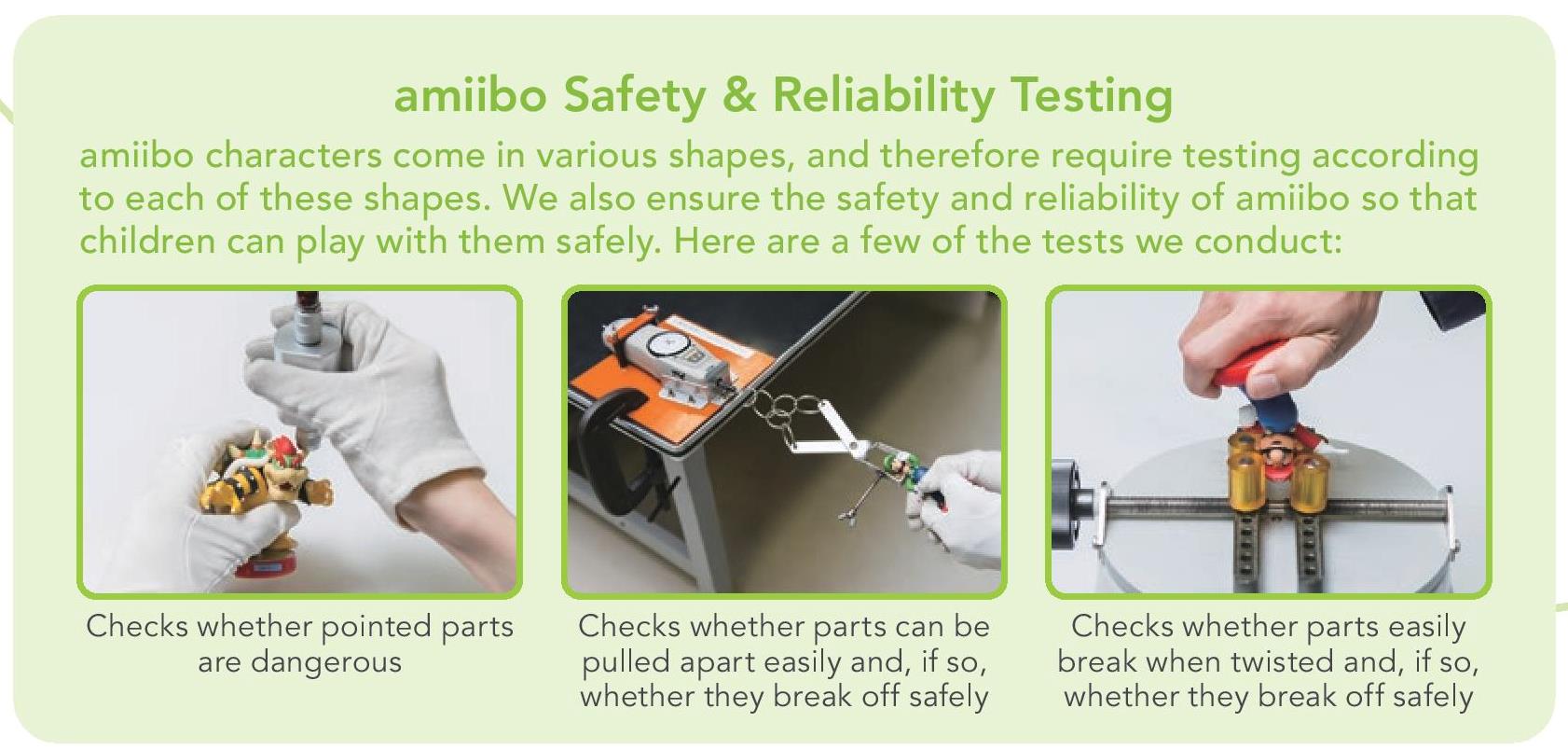
More: Amiibo, interview, Masaki Amano, top
Nintendo assisted 13AM Games in getting guest characters into Runbow
Posted on 10 years ago by Brian(@NE_Brian) in News, Wii U eShop | 0 comments
13AM Games has further discussed the cameo appearances of characters in Runbow.
For those who are unaware, the game features guest stars including Shovel Knight and Rusty from SteamWorld Dig. There are several other familiar faces as well.
Interestingly, it sounds like Nintendo assisted 13AM Games in getting these cameos into Runbow. Creative director and designer Alex Rushdy spoke with Nintendo Life about how the Big N ended up getting involved, as well as the partnerships with the other indies in general:
We owe some of that gratitude to Nintendo. We came up with a wishlist of developers that we love and admire, and Nintendo helped facilitate conversations with about 90% of the list. From the get go we wanted Runbow, our first game, to be a celebration of games we love and the spirit of community that local multiplayer games inspire. We’re pretty lucky to be here in Toronto where the indie scene is so supportive of one another. It was the kind of atmosphere and attitude we wanted to bring back to the industry when we got started, so we just started asking people if they wanted to join the run. The really humbling thing is when that 90% of the list started responding and saying they’d like to work with us. We feel incredibly lucky.
More: 13AM Games, Alex Rushdy, indie, interview, Runbow
Yuji Horii on Dragon Quest XI – story theme, choice of platforms, protagonist, and more
Posted on 10 years ago by Brian(@NE_Brian) in 3DS, News | 4 Comments
Gematsu has translated a number of comments from Dragon Quest creator Yuji Horii about the series’ newest entry, Dragon Quest XI. Horii spoke with Jump about several topics, including the story theme, platform choice, protagonist, and more.
Head past the break for Horii’s comments. You can find Gematsu’s original article here.
More: Dragon Quest XI, interview, Square Enix, top, Toylogic, Yuji Horii
13AM Games on how Runbow’s guest character appearances came to be
Posted on 10 years ago by Brian(@NE_Brian) in News, Wii U eShop | 0 comments
Runbow features guest appearances from a bunch of other indie titles. The lineup includes Rusty from SteamWorld Dig, Shovel Knight from Yacht Club’s indie hit, and plenty more.
13AM Games spoke about how these collaborations came to be in an interview with Toronto GameDevs. The studio explained:
It all started at IndieCade 2014, where Nintendo invited us to demo our game. At the event, our booth was next to developers like Yacht Club Games and Ronimo Games. Our character at the time, Hue, had a pretty similar facial structure to Shovel Knight and the we jokingly asked if we could throw him in our game. After hearing the idea out loud, both sides realized it was actually an interesting proposition. They agreed and we used this show of faith and a little help from Nintendo to reach out and contact as many indie Wii U developers we could. Due to the awesome nature of indie developers, we received a bunch of positive feedback and quickly assembled a pretty large cast of interesting characters. From there, it was just on our artist’s to realize these other characters in our art style and make them all work, and I think they nailed it.
Runbow is due out sometime in Q3. No specific release date yet, though we’ll let you know as soon as we hear something on that front.
More: 13AM Games, indie, interview, Runbow
13AM Games – Wii U benefits from Wiimote support, not worried about the console’s sales, more
Posted on 10 years ago by Brian(@NE_Brian) in News, Wii U eShop | 1 Comment
Engadget put up a new interview with a couple of folks from 13AM Games. The site spoke with Dave Proctor and Alex Rushdy, who are developing Runbow for Wii U.
You can read up on what Proctor and Rushdy said below with topics including talk of releasing Runbow on Wii U and the term “indie”. Check out Engadget’s original piece here.
More: 13AM Games, Alex Rushdy, Dave Proctor, indie, interview, Runbow
Suda51 on No More Heroes and love for Travis, Killer7, cancelled Silver Case DS port
Posted on 10 years ago by Brian(@NE_Brian) in DS, GameCube, News, Wii | 7 Comments
The folks over at Anime News Network have published an interview with Suda51. The two sides talked a bunch about No More Heroes, Killer7, and even the Silver Case DS port that never made it to market.
You can find a few excerpts that we’ve picked out below. For the full interview, head on over here.
